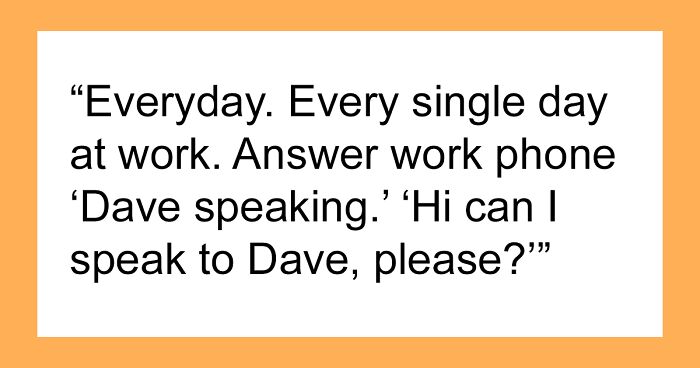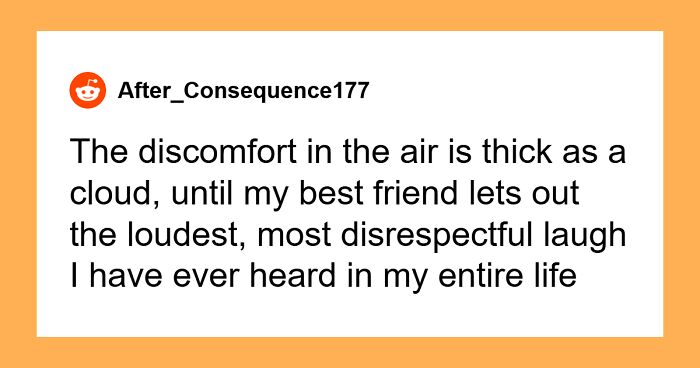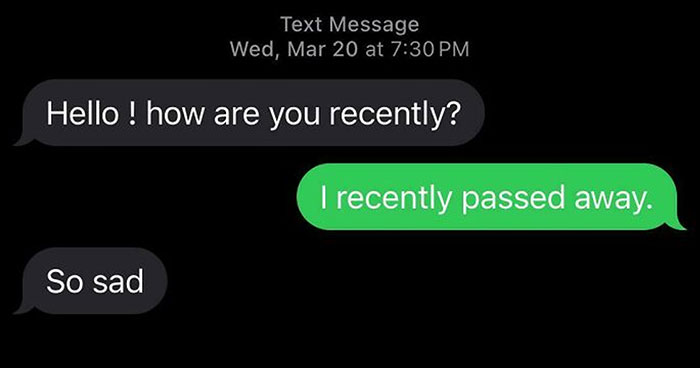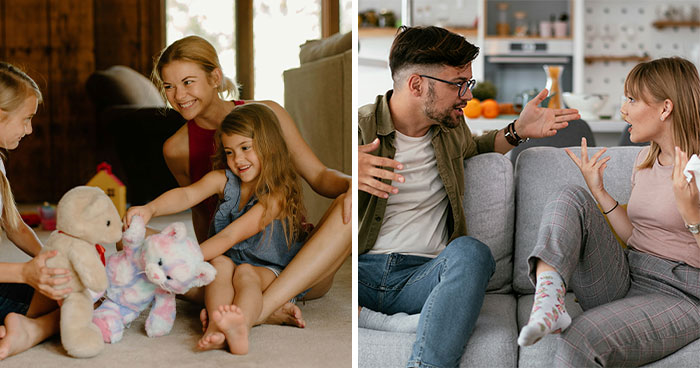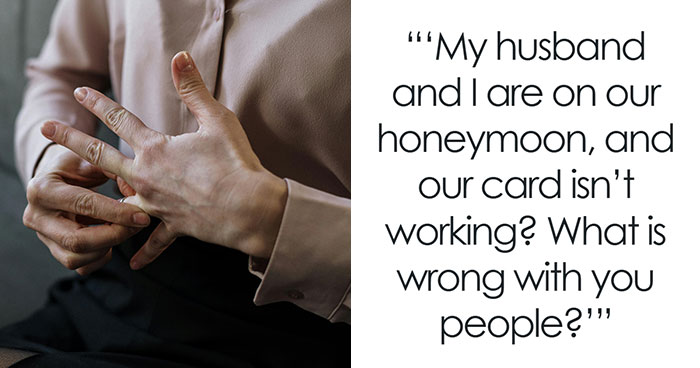
Woman Grew Up Poor While Her Husband Grew Up In Upper Class, Here Are 10 Of Their Differences
InterviewMoving in together with your partner is said to be one of the greatest joys in life. Not only do you get to start each day with your soulmate by your side, but you also get to learn all their quirks — however annoying they may be.
In Michaela‘s and Alex‘s case, the couple quickly noticed that besides some occasional snoring or contrasting spending habits, their upbringing in different economic classes made the pair appreciate and do things quite differently.
To celebrate these differences, the couple shared their contradicting habits on TikTok in a three-part series that has been viewed almost 9 million times.
After noticing the differences in their habits, this couple released a series of TikToks that captures what it’s like to live with someone who comes from a different social class

@cuddleswpuddles@cuddleswpuddles All I could fit in 60s. #poverty #upperclass #lowerclass #middleclass #millennial #foodinsecurity #couple #marriage #ROMWEGetGraphic #fyp #foryou ♬ original sound - cuddles
This post may include affiliate links.
 When grocery shopping, Alex would always get the name brand. I had to teach him that store brand is just as good with a few notable exceptions.
When grocery shopping, Alex would always get the name brand. I had to teach him that store brand is just as good with a few notable exceptions.
In the paper titled 'Is America coming apart?' the authors argue that income inequality and the gap between the rich and poor are at their "all-time high." Hence the increasing segregation between different socioeconomic classes.
In order to find out if class differences affect intimate relationships — as highlighted in Michaela's and Alex's case — Jessi Streib, Duke University's sociology professor and the author of 'The Power of the Past: Understanding Cross-Class Marriages', has dedicated his entire research to this. "So often we think about how class differences keep us apart," Streib explained to Bored Panda. "I wanted to know if and how they draw us together."
After studying and extensively interviewing 32 couples in which one partner comes from a well-to-do family and the other from a "blue-collar" one —as well as 10 couples in which both partners grew up in the same economic class— Jessi was able to discover that "strangers who grew up in the same social class had more in common with each other than they did with spouses with whom they shared their lives."
 Alex grew up with only purebred poodles as his dogs. My childhood dog was a mutt from the pound. But together we adopted this pitbull mix from the county shelter in Atlanta.
Alex grew up with only purebred poodles as his dogs. My childhood dog was a mutt from the pound. But together we adopted this pitbull mix from the county shelter in Atlanta.
Jessi thinks that the 'opposites attract' law, which not only applies to people's personalities but apparently their upbringing in different socioeconomic backgrounds too, partly comes from problem-solving. "People in each class face a distinct set of problems, and sometimes those who grow up in other classes have the solutions," she said.
"For example, people who grew up with white-collar parents often felt that their parents pushed them to have academic and extracurricular achievements." Which, as most of us are aware, means being away from your beloved family — something that folks from the lower-class get to experience less often due to lack of funds or opportunities.
As Jessi explains, this is all connected because "people from white-collar backgrounds are then often drawn to people from blue-collar backgrounds because they see them as able to help them have the close family relationships they always wanted."
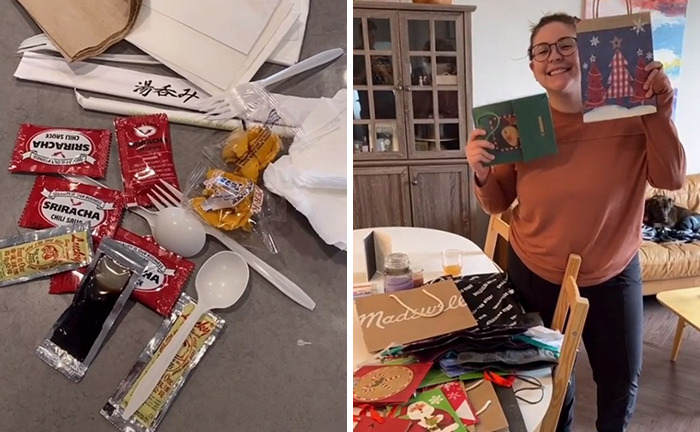 Michaela keeps everything from every takeout restaurant we've ever ordered from. There's a whole drawer full of this stuff. She also keeps all of our gift bags which is great for holidays, birthdays, gift-giving, making it a lot easier.
Michaela keeps everything from every takeout restaurant we've ever ordered from. There's a whole drawer full of this stuff. She also keeps all of our gift bags which is great for holidays, birthdays, gift-giving, making it a lot easier.
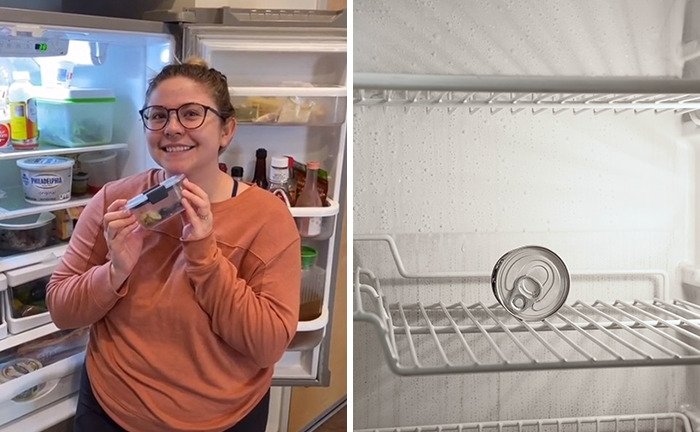 I like to finish all of our leftovers. Michaela will not finish the last of anything in the fridge. This is a byproduct of her growing up with food insecurity and not necessarily knowing where her next meal will come from.
I like to finish all of our leftovers. Michaela will not finish the last of anything in the fridge. This is a byproduct of her growing up with food insecurity and not necessarily knowing where her next meal will come from.
The biggest hurdle that mixed-class couples faced, according to Jessi's study, was the difference in planning and preparation. "The big difference that couples faced was whether to manage everything or to take it as it comes."
To our own surprise, partners from wealthy families would usually take the lead. "They grew up with financial security and parents in positions of authority. This allowed them to be able to predict the future and want to try to control their surroundings," Streib reasoned.
"People who grew up in blue-collar families often have less financial security and authority. So other people and events throw things at them, and they become very good at reacting. Seeing the future as unpredictable, they want to take things as they come."
Or, to borrow a golden phrase from John Lennon: "Life happens when you're busy making other plans." As long as you're making those plans together, despite the differences in habits and upbringing, that's what matters in the end.
 We are 26 and Alex has never bought a car, laptop, or cellphone himself. And I have purchased every car, laptop, and cellphone that I've ever owned.
We are 26 and Alex has never bought a car, laptop, or cellphone himself. And I have purchased every car, laptop, and cellphone that I've ever owned.
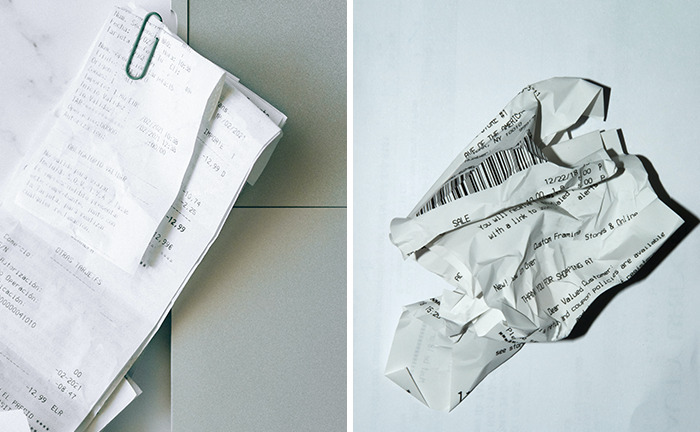 I keep all of my receipts in case there's something wrong with something that I bought and have to return it. Alex doesn't keep receipts because if there's something wrong with what he bought, he'll just buy another one.
I keep all of my receipts in case there's something wrong with something that I bought and have to return it. Alex doesn't keep receipts because if there's something wrong with what he bought, he'll just buy another one.
 Every time I leave a room and leave the light switch on, she will turn it off. Even if I'm going right back into that room a minute later.
Every time I leave a room and leave the light switch on, she will turn it off. Even if I'm going right back into that room a minute later.
 When eating a meal, I always finished my plate because I was not allowed to leave the table until I finished my plate and was told I was wasteful, if I didn't. My husband will eat until he's full like a regular human.
When eating a meal, I always finished my plate because I was not allowed to leave the table until I finished my plate and was told I was wasteful, if I didn't. My husband will eat until he's full like a regular human.
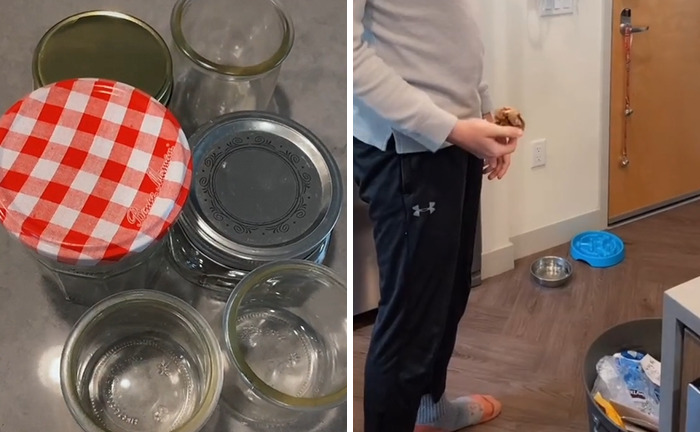 I have a collection of jars in case I can reuse them. I was taught to never throw anything away. And Alex will throw away or recycle stuff when he's done with it.
I have a collection of jars in case I can reuse them. I was taught to never throw anything away. And Alex will throw away or recycle stuff when he's done with it.
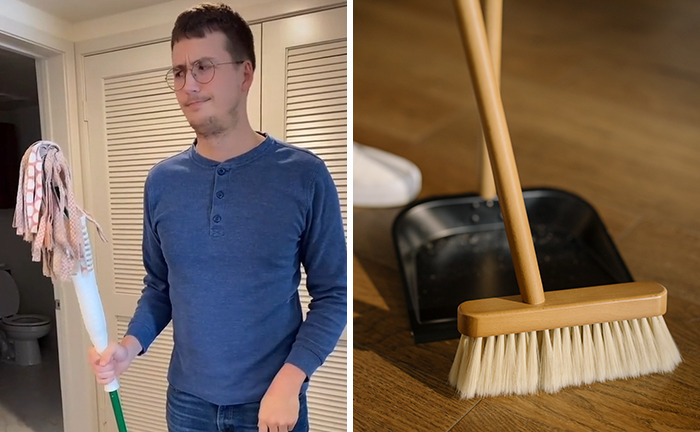 Alex is good at picking up but he's not as good at cleaning because he always had to pick up for the cleaning service that he had his whole life. I'm better at cleaning because if I wanted something to be clean, I had to do it myself, but I am just naturally messier than he is.
Alex is good at picking up but he's not as good at cleaning because he always had to pick up for the cleaning service that he had his whole life. I'm better at cleaning because if I wanted something to be clean, I had to do it myself, but I am just naturally messier than he is.
A lot of viewers could relate to Michaela's hardships and observations highlighted in their TikToks

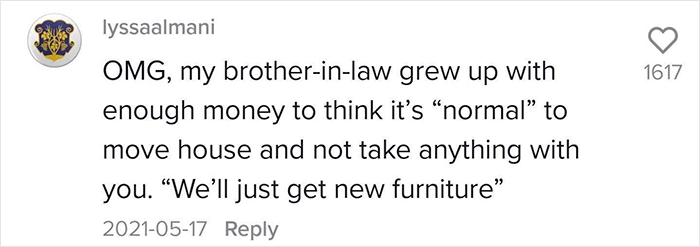


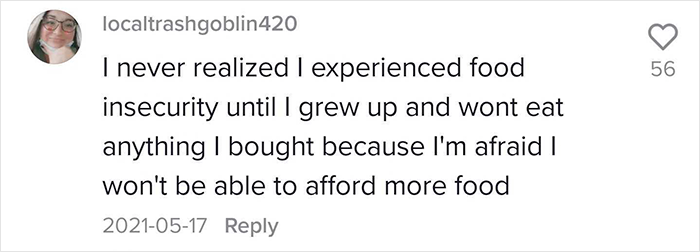
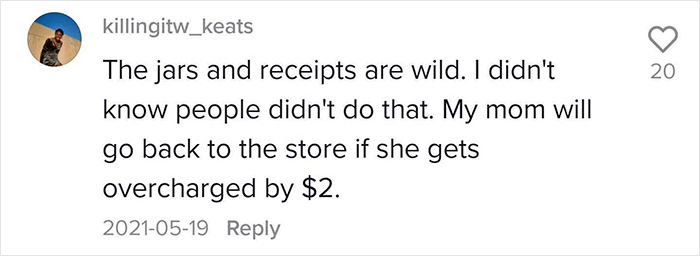


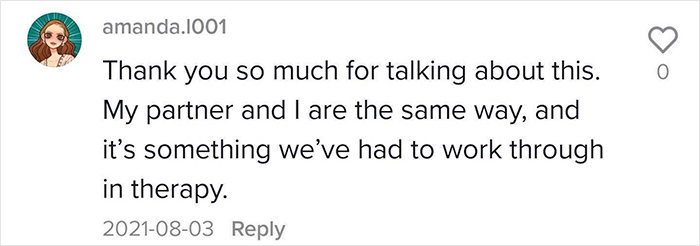
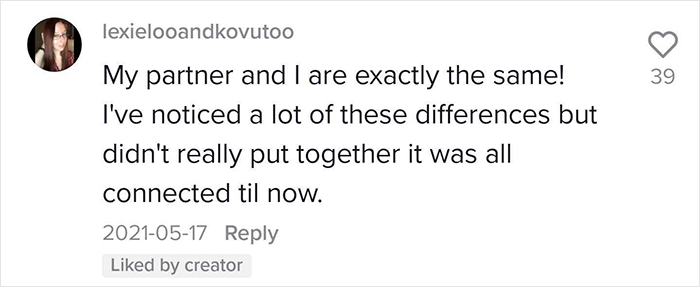
I used to be like Alex, but with the age I've become Michaela. Not because I was raised in a wealthy family - I wasn't. It's not about money, I feel I've just become more conscious, started carying for environment, avoiding waste and limiting consumption.
You don't have to be poor to not be wasteful and try to save some money. e.g. I'd always turn the lights off when I leave a room and I try to avoid food waste. Helps a little to save the planet and I waste less money
Have lived my whole life in third world country, It's kind of funny to see what poverty means for an American 😂
It was the exact opposite with me and two of my old relationships. They both came from poorer backgrounds and I had to fight them to get them to save any money. "Let's spend the money while we have it" they said.
my ex came from a family that was well off and his parents wanted him to 'have everything they didn't'. he didn't understand budgeting, off-brands, etc. it was hard in the beginning. i especially remembered he didn't know what a coupon was but by the time we split he was the one looking and/or using coupons. interesting changes.
None of these have nothing to do with having wealth or not. I've seen the same behaviour in different social classes.
I’d say that my family and I are fairly well off, like if I want something and it isn’t an unreasonable price then I’ll usually be able to get it, I don’t have an allowance, etc. However, my parents didn’t grow up as well of as we are now, so we have a drawer full of fortune cookies, ketchup packets, etc, and a bunch of old paper bags, and that kind of stuff. Since environmental concern is big now, I think this is a good idea no matter your class.
There are many wealthy people who are frugal. Warren Buffett is notorious for pinching pennies.
This is also just however you're raised because my family was very well off financially but I have a food scarcity mindset because I was moderate to severely neglected and didn't know where my next meal would come from even though we always had plenty of food in the kitchen. We couldn't just get whatever we wanted from the kitchen because we didn't want to be yelled at for touching stuff we weren't supposed to.
They really missed an opportunity to talk about the impact of learned food behaviors like being told to always clean your plate/pack in food on obesity. Also, what's with all of these trust fund kids dressing like they buy their clothes in the Walmart clearance section and having the world's scrubbiest facial hair? Dude literally has a neckbeard.
My wife and I have a lot of these same differences. However, my parents were barely middle class. Perhaps some of this is gender differences?
I was brought up middle class, admittedly lower middle, but definitely not poor. Apart from the food insecurity i was brought up like Mikaela. Alex is definitely from a wealthy family. I wouldnt call his upbringing middle class
I can relates n comments on almost every things aboves. Coming from poor family, being in ups n down of my careers n life, almost all (and more) being mentioned above relates to myself n habits.
My kids father is soooo wasteful. He grew up privelidged throws everything away when done except niw he only has a basic job and is always out of money because he spends it like its alway there. He never learned to plan and save. I grew up upper part of low class or low middle. We didn't have food scarcity but we grew most of our food and made everything we could ourself and went without if it was expensive unless it was absolutely necessary. As a result now I actually have a good paying job but often try to still think that I have to make it myself, which I've just now learning is sometimes just cheaper to buy it if time is money. Crazy hiw time changes things
My mom grew up with not a lot and her sisters would constantly throw out all of her things. I had a lot of my stuff stolen when I saved up a year for it with a bit of spare change I'd find or earn. I'm also nervous to eat the last of anything in the fridge not out of politeness but because as a kid we went through lean times where we had beans and hotdogs bought on sale for lunches. I vividly remember the fridge being near empty at that point. I have zero idea if it's an accurate memory, but in my brain if the fridge is full you're well off and if it isn't you aren't. (Most of the time it isn't the case, most of my friends just don't really cook.)
My partner is from an "upper middle class" background and I am from a "lower middle class" background. I was never in poverty, strictly speaking, and she was never so well off that "money didn't matter" but we certainly have different habits. While it shows some in our spending, the place it really shows up is in our attitudes about education and work, and I would say my life experience (which includes some teaching in a fairly broad variety of settings) has made me even more aware that attitudes about education, and details about how people approach it, often mark some of the biggest differences between "social class".
I used to be like Alex, but with the age I've become Michaela. Not because I was raised in a wealthy family - I wasn't. It's not about money, I feel I've just become more conscious, started carying for environment, avoiding waste and limiting consumption.
You don't have to be poor to not be wasteful and try to save some money. e.g. I'd always turn the lights off when I leave a room and I try to avoid food waste. Helps a little to save the planet and I waste less money
Have lived my whole life in third world country, It's kind of funny to see what poverty means for an American 😂
It was the exact opposite with me and two of my old relationships. They both came from poorer backgrounds and I had to fight them to get them to save any money. "Let's spend the money while we have it" they said.
my ex came from a family that was well off and his parents wanted him to 'have everything they didn't'. he didn't understand budgeting, off-brands, etc. it was hard in the beginning. i especially remembered he didn't know what a coupon was but by the time we split he was the one looking and/or using coupons. interesting changes.
None of these have nothing to do with having wealth or not. I've seen the same behaviour in different social classes.
I’d say that my family and I are fairly well off, like if I want something and it isn’t an unreasonable price then I’ll usually be able to get it, I don’t have an allowance, etc. However, my parents didn’t grow up as well of as we are now, so we have a drawer full of fortune cookies, ketchup packets, etc, and a bunch of old paper bags, and that kind of stuff. Since environmental concern is big now, I think this is a good idea no matter your class.
There are many wealthy people who are frugal. Warren Buffett is notorious for pinching pennies.
This is also just however you're raised because my family was very well off financially but I have a food scarcity mindset because I was moderate to severely neglected and didn't know where my next meal would come from even though we always had plenty of food in the kitchen. We couldn't just get whatever we wanted from the kitchen because we didn't want to be yelled at for touching stuff we weren't supposed to.
They really missed an opportunity to talk about the impact of learned food behaviors like being told to always clean your plate/pack in food on obesity. Also, what's with all of these trust fund kids dressing like they buy their clothes in the Walmart clearance section and having the world's scrubbiest facial hair? Dude literally has a neckbeard.
My wife and I have a lot of these same differences. However, my parents were barely middle class. Perhaps some of this is gender differences?
I was brought up middle class, admittedly lower middle, but definitely not poor. Apart from the food insecurity i was brought up like Mikaela. Alex is definitely from a wealthy family. I wouldnt call his upbringing middle class
I can relates n comments on almost every things aboves. Coming from poor family, being in ups n down of my careers n life, almost all (and more) being mentioned above relates to myself n habits.
My kids father is soooo wasteful. He grew up privelidged throws everything away when done except niw he only has a basic job and is always out of money because he spends it like its alway there. He never learned to plan and save. I grew up upper part of low class or low middle. We didn't have food scarcity but we grew most of our food and made everything we could ourself and went without if it was expensive unless it was absolutely necessary. As a result now I actually have a good paying job but often try to still think that I have to make it myself, which I've just now learning is sometimes just cheaper to buy it if time is money. Crazy hiw time changes things
My mom grew up with not a lot and her sisters would constantly throw out all of her things. I had a lot of my stuff stolen when I saved up a year for it with a bit of spare change I'd find or earn. I'm also nervous to eat the last of anything in the fridge not out of politeness but because as a kid we went through lean times where we had beans and hotdogs bought on sale for lunches. I vividly remember the fridge being near empty at that point. I have zero idea if it's an accurate memory, but in my brain if the fridge is full you're well off and if it isn't you aren't. (Most of the time it isn't the case, most of my friends just don't really cook.)
My partner is from an "upper middle class" background and I am from a "lower middle class" background. I was never in poverty, strictly speaking, and she was never so well off that "money didn't matter" but we certainly have different habits. While it shows some in our spending, the place it really shows up is in our attitudes about education and work, and I would say my life experience (which includes some teaching in a fairly broad variety of settings) has made me even more aware that attitudes about education, and details about how people approach it, often mark some of the biggest differences between "social class".

 Dark Mode
Dark Mode 

 No fees, cancel anytime
No fees, cancel anytime 


















